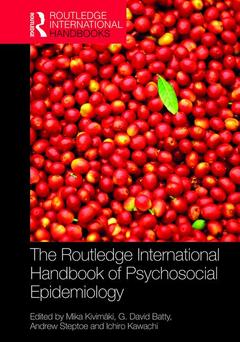The Routledge International Handbook of Psychosocial Epidemiology Routledge International Handbooks Series
Coordonnateurs : Kivimäki Mika, Batty David, Kawachi Ichiro, Steptoe Andrew

The health effects of psychosocial factors are a widely discussed and controversial topic. Do positive and negative emotions affect our risk of developing physical disease? Are depressive individuals more likely to have cancer than those with an optimistic outlook on life? And what is the role of IQ in staying healthy and recovering from disease? Importantly, can we improve our health and life expectancy by avoiding certain psychosocial risk factors and maximizing positive psychological well-being? These and other questions are the focus of psychosocial epidemiology, a discipline linking psychological, social and biological sciences.
The Routledge International Handbook of Psychosocial Epidemiology is the first book to map this growing discipline. Including contributions from many of the leading researchers in the field, it is divided into five sections:
- Part I: Methodological challenges in studying psychosocial factors and health;
- Part II: Psychosocial factors in the etiology and prognosis of chronic diseases;
- Part III: Controversies in the psychosocial approach;
- Part IV: Interventions and policy implications
- Part V: Future research directions
Taking advantage of a huge growth in research in recent years, the book provides the reader with the essentials to evaluate the diverse set of studies on psychosocial factors and health that are published today, and describes study designs in this field of research, progress in judging the validity of epidemiological evidence, as well as challenges in translating evidence into action.
This is an important and timely book. Providing methodological rigour, critical analysis and the policy implications of this emerging field of study, The Routledge International Handbook of Psychosocial Epidemiology will be an invaluable resource for students and researchers within both behavioural and medical sciences, as well as policy makers and others working in health and social care.
Foreword
Professor Lisa Bergman
Part I: Concepts and Methods in the Study of Psychosocial Factors and Health
Chapter 1 Psychosocial Epidemiology: Concepts and Methods
Mika Kivimäki, G. David Batty, Andrew Steptoe, Ichiro Kawachi
Chapter 2 Causal Inference in Psychosocial Epidemiology
M. Maria Glymour, Laura D. Kubzansky
Part II: Psychosocial Factors Linked to Health
Chapter 3 Social Networks
Yongjoo Kim, Ichiro Kawachi
Chapter 4 Workplace Stressors
Mika Kivimäki, Jane E. Ferrie, Ichiro Kawachi
Chapter 5 Religious Communities
Tyler J. VanderWeele
Chapter 6 Depression and Negative Emotions
Andrew Steptoe
Chapter 7 Positive Psychological Wellbeing
Julie K. Boehm, Eric S. Kim, Laura D. Kubzansky
Chapter 8 Personality, Intelligence and Genes
Michelle Luciano, Alexander Weiss, Catharine Gale, Ian J. Deary
Chapter 9 Gender Differences in the Health Effects of Psychosocial Factors
Anne McMunn et al
Part III: Psychosocial Factors in the Etiology and Prognosis of Specific Diseases and Disorders
Chapter 10 Type 2 Diabetes
Frans Pouwer, Briana Mezuk, Adam Tabak
Chapter 11 Cardiovascular Diseases
Mika Kivimäki
Chapter 12 Cancer
Katriina Heikkilä, Markus Jokela
Chapter 13 Infectious Disease
Allison E. Aiello, Amanda M. Simanek, Rebecca C. Stebbins, Jennifer B. Dowd
Chapter 14 Suicide
G. David Batty, Mika Kivimäki, Steven Bell, Catherine Gale, Martin J. Shipley, Elise Whitley, David Gunnell
Chapter 15 Mood Disorders and Cognitive Impairment
Klaus P. Ebmeier, Charlotte Allen, Anya Topiwala, Eniko Zoldos
Chapter 16 Sleep Disorders
Torbjörn Åkerstedt
Part IV: Interventions and Policy Implications
Chapter 17 Behavioral and Psychological Interventions for the Management of Cardiac Patients
Alan Rozanski
Chapter 18 Targeting Psychosocial Factors to Reduce Health Inequalities
Angela Donkin, Michael G. Marmot
Part V: Future Research Directions
Chapter 19 Current State of Psychosocial Epidemiology: Where Are We? What Are the Next Steps?
Mika Kivimäki, Andrew Steptoe, G. David Batty, Ichiro Kawachi
Mika Kivimaki is Professor and Chair of Social Epidemiology at the Department of Epidemiology and Public Health at University College London, UK, Director of the UK Whitehall II cohort study, Research Professor in Clinicum, Faculty of Medicine, University of Helsinki, Finland, and Principal Investigator of the IPD-Work Cohort Consortium.
G David Batty is Professor of Epidemiology in the Department of Epidemiology & Public Health at University College London, UK, an Honorary Professor of Epidemiology in the MRC Centre for Cognitive Ageing and Cognitive Epidemiology at the University of Edinburgh, and a Visiting Professor at the University of Glasgow.
Andrew Steptoe is Head of the Department of Behavioural Science and Health in the Institute of Epidemiology and Health Care in the Faculty of Population Health Sciences, University College London, UK, and Principal Investigator of the English Longitudinal Study of Ageing (ELSA).
Ichiro Kawachi is John L. Loeb and Frances Lehman Loeb Professor of Social Epidemiology, and Chair of the Social & Behavioral Sciences Department at the Harvard T.H. Chan School of Public Health, USA.
Date de parution : 12-2017
15.6x23.4 cm
Thème de The Routledge International Handbook of Psychosocial... :
Mots-clés :
Implantable Cardioverter Defibrillators; psychosocial factors; Psychosocial Epidemiology; negative emotions; UK Biobank; positive emotions; Ischaemic Stroke; disease-prone personality; Psychosocial Risk Factors; depression; Religious Service Attendance; epidemiology; Job Strain; cardiovascular diseases; Psychosocial Exposures; population health; Effort Reward Imbalance Model; stress; Incident Coronary Heart Disease; etiology; Allostatic Load; chronic conditions; American Psychiatric Association; respiratory diseases; Marginal Structural Models; type 2 diabetes; Unmeasured Confounders; dementia; Mendelian Randomization; reproductive health; Major Depression; Observational Evidence; Data Sets; Professor Sir Michael G; Marmot; Allostatic Load Index; life-course; Polygenic Scores; Social Networks; Ideal Cardiovascular Health; cancers; Meta-analytic Structural Equation Modelling; etiological; Cortisol Awakening Response; social capital; Service Attendance; Infectious Disease Paradigm; Emerging Risk Factor Collaboration; suicide; Telomere Length; Prognosis; genetically determined; Economic Consequences; G; David Batty; Andrew Steptoe; Ichiro Kawachi; M; Maria Glymour; Laura D; Kubzansky; Yongjoo Kim; Jane E; Ferrie; Tyler J; VanderWeele; Julia K; Boehm; Eric S; Kim; Michelle Luciano; Alexander Weiss; Catharine R; Gale; Ian J; Deary; Anne McMunn; Frans Pouwer; Briana Mezuk; Katriina Heikkilä; Markus Jokela; Allison E; Aiello; Amanda M; Simanek; Rebecca C; Stebbins; Jennifer B; Dowd; Steven Bell; Martin J; Shipley; Elise Whitley; David Gunnell; Klaus P; Ebmeier; Charlotte Allan; Anya Topiwala; Eniko“ Zsoldos; Torbjörn Åkerstedt; Alan Rozanski; Angela Donkin; Michael G; Marmot



